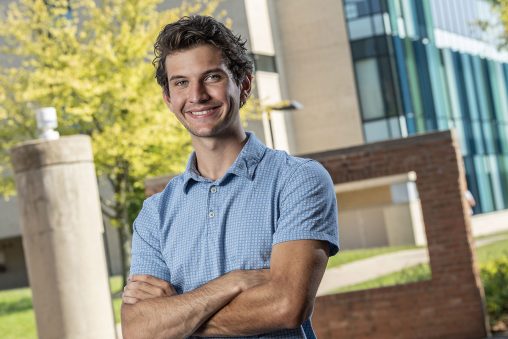
Garrett Regan, a senior majoring in biomedical engineering at Wright State, utilizes machine learning to detect aneurysms on CT scans during an internship. (Photo by Erin Pence)
The explosion of an improvised explosive device in Afghanistan that cost a family relative his legs sparked 12-year-old Garrett Regan’s interest in biomedical engineering.
Currently a senior majoring in biomedical engineering at Wright State University, Regan recalled being fascinated when his relative, who was serving in the Marines, was outfitted with prosthetic limbs.
“His adaptation to using prosthetics was what introduced me to the field,” Regan said. “Prosthetics were my first passion within biomedical engineering.”
Regan is interning with Miamisburg-based Riverain Technologies, which develops computer software tools to enhance early disease detection.
Regan’s focus has been on the aorta, the main artery that carries blood away from the heart to the rest of the body. One of the diseases he works on is aortic aneurysm, a balloon-like bulge in the aorta that can lead to its rupture and a high death rate.
The goal is to give radiologists a better, quicker way to detect aneurysms on a computed tomography (CT) scan. Given the large number of CT scans that need to be reviewed, the idea is to more quickly identify critical cases and get patients quickly to the operating room for what could be life-saving surgery.
Regan is utilizing machine learning, the use of computer algorithms to identify the specific features of a target image to improve classification accuracy once the machine-learning model is provided with extensive examples.
“What you are trying to do is teach a computer what a disease looks like so that they can identify it,” he said. “If you can catch something like that on an incidental CT scan early, then you avoid patients returning to the hospital with a ruptured aorta, where they have a 20 percent chance of survival.”
Regan, who began the internship in May and continues to work at the company one day a week, said the most gratifying part of his work is knowing that it will save lives.
“When this work is done and commercialized for different hospitals, it’s going out somewhere to try to help people and prevent people from dying,” he said.
Regan grew up near Wilmington on an angus beef farm. After graduating from Wilmington High School in 2018, he enrolled at Wright State.
“Wright State had one of the few colleges in the area that had a dedicated biomedical engineering program,” said Regan, whose sister graduated from Wright State in 2018 with a degree in biological sciences.
Regan said the highlight of his time at Wright State has been his involvement in the Wright State chapter of Engineers Without Borders, a student-led group that focuses on need-based engineering service projects. He currently serves as vice president.
The group is working on a project at the Russ Nature Reserve in Beavercreek designing an elevated observation deck. The students are also involved in an international sanitation project in Uganda, working remotely until COVID-19 travel restrictions are lifted by passing their designs on to engineers in the African nation.
In 2020, Regan and the Wright State chapter oversaw the installation of a handwashing station at a secondary school in Uganda. Months after returning home, the students learned that the station had been reproduced in another area near the school.
“That’s been one of the biggest projects I’ve been involved in not only in college but personally — seeing what you can do by giving someone something as simple as a handwashing station,” he said. “You give them something to wash their hands and then there’s a global pandemic. You don’t think about the impact that you are able to have until something like that happens.”
Regan said Wright State has prepared him for success.
“All of the faculty and classes I’ve been involved in have been far and away been some of the biggest influences on me being able to do the work that I’m doing,” he said.
Following graduation, Regan hopes to earn a graduate degree in biomedical engineering with a focus on machine learning.

 Walking through open doors
Walking through open doors  Adventures await
Adventures await  Wright State to expand nursing facilities to meet workforce needs and prepare more graduates for in-demand careers
Wright State to expand nursing facilities to meet workforce needs and prepare more graduates for in-demand careers  Wright State student-athletes make a lasting impact on local family with more to come
Wright State student-athletes make a lasting impact on local family with more to come  Wright State names Rajneesh Suri dean of Raj Soin College of Business
Wright State names Rajneesh Suri dean of Raj Soin College of Business 